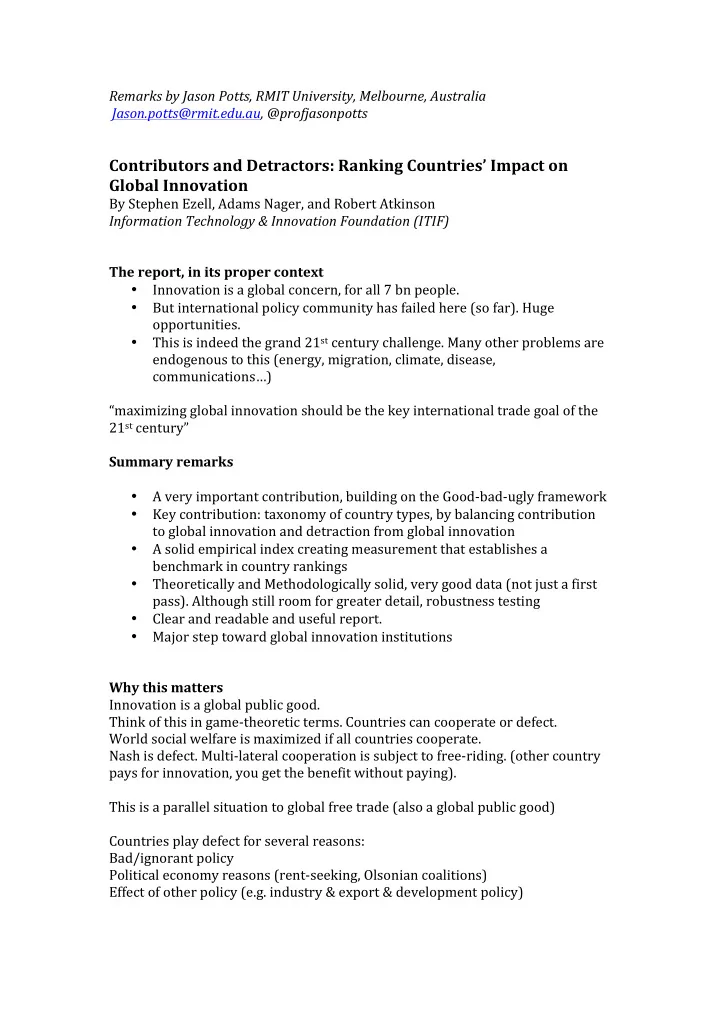

Remarks by Jason Potts, RMIT University, Melbourne, Australia Jason.potts@rmit.edu.au, @profjasonpotts Contributors and Detractors: Ranking Countries’ Impact on Global Innovation By Stephen Ezell, Adams Nager, and Robert Atkinson Information Technology & Innovation Foundation (ITIF) The report, in its proper context • Innovation is a global concern, for all 7 bn people. • But international policy community has failed here (so far). Huge opportunities. • This is indeed the grand 21 st century challenge. Many other problems are endogenous to this (energy, migration, climate, disease, communications…) “maximizing global innovation should be the key international trade goal of the 21 st century” Summary remarks • A very important contribution, building on the Good-bad-ugly framework • Key contribution: taxonomy of country types, by balancing contribution to global innovation and detraction from global innovation • A solid empirical index creating measurement that establishes a benchmark in country rankings • Theoretically and Methodologically solid, very good data (not just a first pass). Although still room for greater detail, robustness testing • Clear and readable and useful report. • Major step toward global innovation institutions Why this matters Innovation is a global public good. Think of this in game-theoretic terms. Countries can cooperate or defect. World social welfare is maximized if all countries cooperate. Nash is defect. Multi-lateral cooperation is subject to free-riding. (other country pays for innovation, you get the benefit without paying). This is a parallel situation to global free trade (also a global public good) Countries play defect for several reasons: Bad/ignorant policy Political economy reasons (rent-seeking, Olsonian coalitions) Effect of other policy (e.g. industry & export & development policy)
Any attempt to design a global institutional solution requires starting with a measure of the current strategies countries are playing. Recognizes that what is best for each nation is not necessarily best for the whole world. This report maps the space of those strategies, and locates 55 countries on that map. This matters because that’s the first step in fixing this problem. What this project does This report (and associated framework) defines and measures current state of individual country strategy – as a mixed strategy of cooperate and defect over many policy measures (indicators) Proposes a theory of innovation policy in terms of whether Country plays cooperate or defect in global innovation policy game. This is assessed in terms of contributions and detractions, using a constructed suite of indictors. Contributions indicators Taxes, Human capital, & R&D technology Detractions indicators Distorted product markets Weak IP protections Distorted consumer markets Theoretically, these indicators make sense. The focus on distortions (called ‘balkanization’ in the report) is a strong contribution. (I would add ‘entrepreneurial discovery’ to the list of contribution indicators. Measures include start-ups, incubators, accelerators, VC finance, cost of starting businesses, etc) Classifications Contributions Detractions Schumpeterian *** * EU Continentalist ** ** Adam Smithian ** * Advanced Asian Tiger *** *** EU Up-and-comer * * Innovation Follower 0 * Innovation Mercantalist 0 ** Traditional Mercantalist 0 *** Implicit logic: world welfare maximized if all countries Schumpeterian – ITIF calls this the ‘Helsinki consensus’
Suggests best practice for innovation policy – an innovation policy charter. Also, gives us a measure of how far we are from that frontier. Policy implications The way we discuss global innovation policy should be the way we discuss global trade policy. Need to view innovation policy the same way we view climate policy – through a global lens. Need to push back against innovation mercantilism (including at the WB, given developing nations a free-ride, as an allocative policy) We need the innovation policy equivalent of Adam Smith – to push back against innovation mercantilism – this is what ITIF is doing. I go further: I think we need a WTO equivalent – A WIO Potts (2015) ‘The national origins of global innovation policy and the case for a World Innovation Organization’ SSRN But, the ITIF report suggests countries not committed to Innovation mercantilism need to need to start collaborating. Forming clubs (a la Climate clubs), treaties and other transnational groups that could eventually align into a global organization. The Helsinki consensus members probably will have to take the lead on this. It would be nice if the US would too, especially given its role in pushing strong IP policy through trade treaties Theory We don’t really have a rich theoretical model of strategic interaction between national innovation policies. This report creates a demand for that. See Potts (2015) ‘National origins…’ as a start Extending and developing the index Missing is very early stage of innovation process: • Discovery of entrepreneurial opportunity (Hausmann & Rodrik 2004) added to the list of contribution indicators. Measures include start-ups, incubators, accelerators, VC finance, cost of starting businesses, etc) • New industry emergence and discovery • My work on innovation commons (governance of opportunity discovery around new technologies, facilitating entrepreneurship, and new firm/new industry creation). Policy model here is open access, role of universities networks, and minimizing protection of incumbents.
Recommend
More recommend